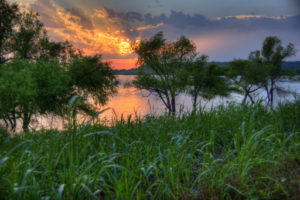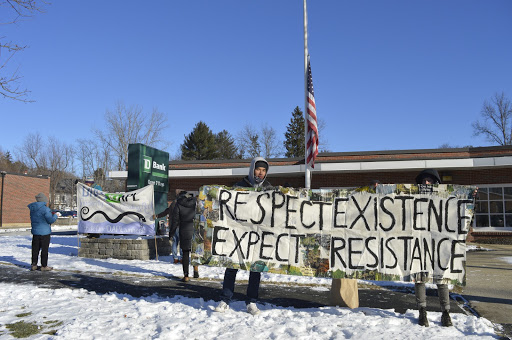The Supreme Court is currently considering whether or not the Muscogee Creek Nation of Oklahoma and surrounding tribes will regain control of 40% of Oklahoma’s land. Their decision could set a precedent for tribes trying to regain rights and lands granted to them in perpetuity by treaty with the United States but lost through a series of acts of Congress. In Oklahoma, the erosion of native nation’s suzerain reservation lands began in 1907. Oklahoma was becoming a state and Congress attempted to dissolve all sovereign tribal government within the state of Oklahoma. Collective tribal holdings were broken up through the allotment process, where native land was given to certain people or families for a small fee.
The current legal battle over who owns the former reservation land in eastern Oklahoma began in 1999, when a man named Patrick Dwayne Murphy, a member of the Muscogee Creek Nation, was convicted for the murder of his girlfriend’s ex-boyfriend, George Jacobs Sr., another member of the Creek Nation. Murphy was tried, convicted and sentenced to death in the state court of Oklahoma. After the trial, Murphy’s attorneys discovered a lone white memorial cross next to a road othat the Creek’s thought of as reservation land. The cross marked the exact location where Jacobs died, several hundreds yards distant from the site allegedby the police.
If Jacobs was murdered on reservation lands, the state did not have jurisdiction over the crime, only the tribal government could try and sentence Murphy. The Muscogee Creek Nation sued to vacate Oklahoma’s verdict, claiming jurisdiction over the crime. The lawyers representing the state of Oklahoma argued that the site was not on the reservation and that only 4% of former Creek land was actually still considered to be reservation.
Within the coming year, the Supreme Court will rule on Carpenter V. Murphy and settle who owns the former reservation land, the state of Oklahoma or the Creek Nation.
If the Supreme Court were to find in favor of the Muscogee Creek Nation, the tribe would regain some sovereignty over their former lands. While currently the state of Oklahoma only acknowledges 4% of its land as being native reservation, if the Creek Nation were to win, native land would increase to be 40% of the state.
What would be the impact of this on non-natives living in Oklahoma? According to Rebecca Nagle, a writer and activist from the neighboring Cherokee Nation, for non-natives living in that 40%, “not much would happen. The same people are going to collect their trash, their kids are going to go to the same school, if they own a small business, all the laws and regulations aren’t going to change.”
For natives, however, a decision in their favor would mean they would regain land that they have considered theirs for over a century and thus native residents there would be governed under tribal laws. And by extension, all tribal members in eastern Oklahoma, not just the ones who live on the current reservation, would be under the governance of their own nation and people for the first time in decades.
If the state of Oklahoma were to win, however, according to Nagle, “What we would continue to lose is land. Right now the only land that Oklahoma acknowledged as Native Land is land that is owned by [descendants] of the original allottees and if the land has never left that family’s hand.”
If the Supreme Court were to decide that the Creeks have no governing power over their former land, it would make it much easier for Oklahoma to start taking more, as the Creeks would have no legal argument that they own much, if any, of the land.
The argument expressed earlier by Nagle is largely supported by Philip Tinker, a member of the Osage Nation in northeastern Oklahoma and a lawyer who was on the Carpenter V. Murphy case. “For people who are not tribal members, the effects will be very mild,” Tinker said. The fact is, tribal governments have very little jurisdiction in terms of dealing with non-natives who live on their land.
One of the only times in which tribal courts have control over non-natives in a criminal matter is pursuant to the Violence Against Women Act which, passed in 1994, provides women who are victims of rape or abuse with protections from their abusers. According to Tinker, “Congress authorized tribal authority against non-tribal members who are in relationships with tribal members and there’s abuse or domestic violence.” This policy means that Native courts have the ability to render a sentence on a non-native if they are abusing a native.
Native women have one of the highest rates of abuse in the nation; four out of five suffer some sort of abuse in their life, majority of which goes unreported. If Creek and surrounding nations had control over more of Oklahoma, they would be able to more effeftively protect and represent native women in court.
Another repercussion of the court voting in favor of the Creeks is that other native nations may sue to get their land back. The government of Oklahoma’s main fear is that if the Creeks win, other nations could see their success and attempt to regain their own land. Nagle and Tinker both see the validity of this argument. Nagle says that if the Creeks win their land back, the four neighboring tribes — Chickasaw, Choctaw, Cherokee and Seminole (together dubbed the Five Civilized Tribes) — would most likely try to regain their land, which, combined, would equal the aforementioned 40%.
Tinker agrees that a favorable decision for the Creeks could result in more nations looking to regain what they lost. However, he argues that these court cases have been happening in circuit courts for years in states with large Native American reservations. In 2016, the Omaha tribe in Nebraska filed an appeal to the Supreme Court to enforce their alcohol tax on all who live on their reservation, including non-natives, an increase in their taxation power. They succeeded, and so did many other nations that litigated similar lawsuits. This has lead to increases in Native power over their land, an outcome Oklahoma fears.
The main argument of the state of Oklahoma largely contradicts both Nagle and Tinker. Oklahoma argues that for non-natives who have never lived under a native government, the changes would be immediate and drastic. Lisa Blatt, the attorney who formerly represented Oklahoma in the Supreme Court, argued that “affirmance would immediately trigger a seismic shift in criminal and civil jurisdiction.” Blatt argues that native governments would gain control over an area containing millions of people, including Oklahoma’s second-largest city, Tulsa.
Both Blatt and Tinker do say there could be changes in the state’s tax revenues. Tinker says, “Members of the Creek Nation would likely not be subject to state income taxes if they both live and work on the reservation.” That would be around 2.5% of Oklahoma’s population that wouldn’t be paying state taxes, depriving one of America’s poorest states of much-needed funding.
Oklahoma also argues that every other native reservation in the U.S. could try to regain their old land. There are 326 registered reservations in the United States, which means there is a lot of land that native governments could gain jurisdiction over. This is entirely possible, though it is unlikely that the ruling of the case would result in the mass native American land grab that Oklahoma fears.
Now back to the impact of a favorable Supreme Court decision on Patrick Dwayne Murphy. Both Jacobs and Murphy were members of the Muscogee Creek Nation of eastern Oklahoma which, like most reservations, has its own governing system and laws. The Muscogee Creek Nation, specifically, outlawed the death penalty. Once informed of the fact that Murphy had committed the murder on former Creek land, the Muscogee Creek Nation got involved. Creek lawyers argued that Murphy could not be convicted by the state of Oklahoma as he is a member of Creek nation and the crime occurred on Creek land.
After the Creek lost in Oklahoma’s district court, the case went to the Tenth Circuit Court of appeals, where the Creek argued against the state. Oklahoma argued that the land was no longer part of any reservation and Oklahoma had not considered it to be such for many years. The Creeks argued that their land had always been under their control. The Creek Nation won in the Tenth Circuit Court, saving Murphy from the death penalty.
Then, in February of 2018, 19 years after Murphy committed the crime, the warden for the Oklahoma state penitentiary filed an appeal to the Supreme Court.
The Supreme Court is currently deciding on the fate of Murphy and whether or not the state of Oklahoma has the right to sentence him to death. However, the case has become much more. The Supreme Court is deciding whether or not the Muscogee Creek Nation, as well as the surrounding Native American Nations of Cherokee, Chickasaw, Choctaw and Seminole, the rest of the “Five Civilized Tribes,” have jurisdiction over all of their former land. If the Supreme Court decides in favor of the Creeks, it will be a first step for Natives who wish to regain a semblance of the power they had before the establishment of the United States.

photo courtesy of Dreamstine by a photographer who chose to remain anonymous






